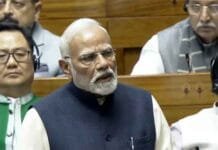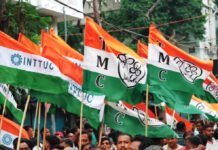INVC NEWS
New Delhi : The Modi government has imposed a ban on the Muslim League in Jammu and Kashmir. Home Minister Amit Shah took to Twitter to inform the public about the ban, attributing it to the organization’s involvement in activities contrary to the nation’s interests.
On Wednesday, December 27th, the Central government enforced the ban on the Muslim League (Jammu and Kashmir, Masrat Alam Group) under the Unlawful Activities (Prevention) Act. The organization and its members are accused of participating in terrorist activities in Jammu and Kashmir and supporting terrorist groups.
Amit Shah, the Central Home Minister, emphasized on social media, “The Muslim League in Jammu and Kashmir (Masrat Alam Group) has been declared an unlawful organization under the UAPA. This organization and its members are involved in anti-national and separatist activities in Jammu and Kashmir.”
About the Masrat Alam Group
The Muslim League Masrat Alam Group is led by Masrat Alam Bhatt. This organization is known for its promotion of anti-India and pro-Pakistan propaganda. Its primary goal is to advocate for the independence of Jammu and Kashmir from India. Members of this organization actively participate in separatist activities in Jammu and Kashmir. The leaders and members are also implicated in supporting terrorists and consistently pelting security forces with stones and engaging in other disruptive activities.
The ban on the Muslim League in Jammu and Kashmir signifies the government’s strong stance against organizations involved in activities that pose a threat to national security. This move aims to curtail anti-national and separatist movements in the region.
The enforcement of the ban has stirred reactions and discussions, both nationally and internationally. Critics argue about the potential impact on democratic principles and freedom of association, while supporters commend the government’s commitment to national security.
As the situation unfolds, it raises questions about the balance between security measures and individual freedoms, prompting a broader conversation on the complexities of managing regional conflicts and safeguarding national interests.
Unique FAQs:
- Q: What prompted the government to impose a ban on the Muslim League in Jammu and Kashmir?
- A: The ban was imposed due to the organization’s alleged involvement in anti-national and separatist activities, as stated by Home Minister Amit Shah.
- Q: How has the ban been received internationally?
- A: The ban has sparked discussions globally, with considerations about its impact on diplomatic relations and human rights concerns.
- Q: What specific activities are the members of the banned organization accused of?
- A: Members are accused of participating in terrorist activities in Jammu and Kashmir and providing support to terrorist groups.
- Q: What is the significance of Masrat Alam Bhatt’s leadership in the Masrat Alam Group?
- A: Masrat Alam Bhatt leads the group, known for its promotion of anti-India and pro-Pakistan propaganda, aiming for the independence of Jammu and Kashmir.
- Q: How do supporters and critics view the government’s decision to impose the ban?
- A: Supporters commend the government’s commitment to national security, while critics raise concerns about potential impacts on democratic principles and freedom of association.













